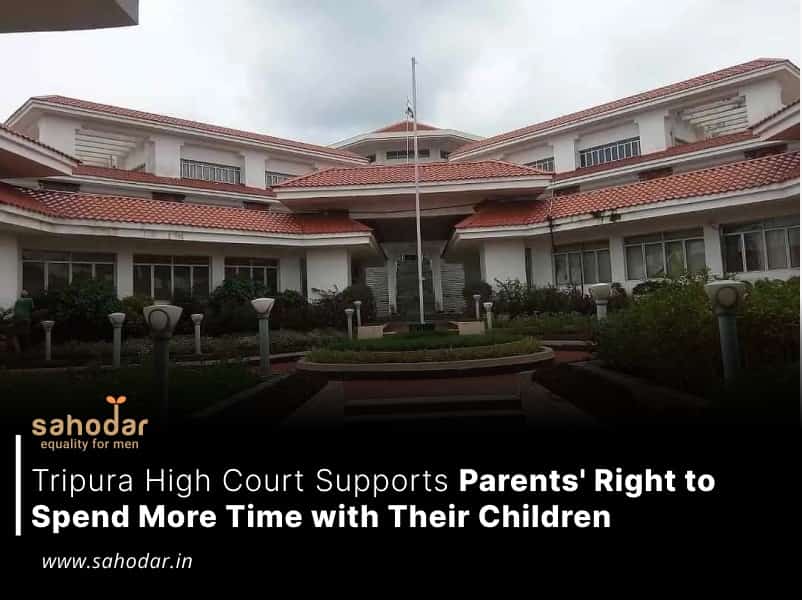“This Court strongly believes that a parent cannot be a guest in their child’s life. If visitation rights only are granted for limited hours, it may not be sufficient for the child to have a comfortable time with the father or mother, whoever may be the case,” the Tripura High Court observed recently as it stressed that overnight custody must be encouraged in custody matters.
The Court also expressed the view that when there’s a significant distance between the parents and the child, it can harm their relationship, leaving the child feeling perplexed. Therefore, the Court emphasized the need to address any actions by a parent that seek to separate the child from the other parent promptly. Failing to do so, the Court warned, could result in the estranged parent becoming more of a “visitor” in the child’s life.
In the matter presided over by Justice T. Amarnath Goud, pertaining to a 6-year-old child and involving her father, Rakesh Chandra Saha, and her paternal grandparents, a Section 482 CrPC petition was considered. This petition challenged a court order issued by the Additional Sessions Judge of the Gomati Judicial District, Udaipur, which had granted interim custody of the child to her mother, the spouse of Saha and petitioner number 1, under the purview of the Domestic Violence Act.
The petitioners contended that the lower court had inadequately assessed the presented evidence and had not provided a sufficient rationale for awarding custody to the mother, particularly in light of her lack of financial means to support the child and her prior abandonment of the child.
The High Court underscored that the primary and paramount consideration when determining child custody is the welfare of the child. In this context, the Court emphasized that the views of both parents should be taken into account and that, even in situations of parental discord, the child’s right to maintain a relationship with both parents should be preserved. This, the Court posited, necessitates affording both parents visitation rights to ensure the child’s continued social, physical, and psychological connection with each parent.
With regard to visitation rights in cases involving disputes between parents, the Court noted that typically, when parents reside in close proximity, the non-custodial parent is accorded visitation rights primarily during weekends.
“In case, the spouses are living at a distance from each other, it may not be feasible or in the interest of the child to create impediments in the education of the child by frequent breaks and, in such cases, the visitation rights must be given over long weekends, breaks and holidays. In cases like the present one where the parents are in two different places far away from each other, effort should be made to give maximum visitation rights to the parent who is denied custody,” the Court further added as it stressed that in addition to “visitation rights”, “contact rights” are also important for the development of the child.
“Unless there are special circumstances to take a different view, the parent who is denied custody of the child should have the right to talk to his/her child for 5-10 minutes every day. This will help in maintaining and improving the bond between the child and the parent who is denied custody. If that bond is maintained, the child will have no difficulty in moving from one home to another during vacations or holidays. The purpose of this is, if one happy home with two parents cannot be provided to the child then let the child have the benefit of two happy homes with one parent each,” the Court observed.
In matters concerning disputes over child custody between parents, the Court recognized that the primary casualty in such conflicts is typically the innocent child, who becomes embroiled in the legal and psychological discord between the parents.
In response, the Court stressed that while other considerations hold relevance, the paramount and definitive factor should be the wishes, interests, and well-being of the minor in question.
Consequently, the Court, considering the specifics of the case, modified the previous court order. The Court issued the following directives regarding the child’s custody:
- The child will reside with the father on Mondays, Thursdays, and Fridays, in light of the child’s school attendance and overnight stays during these days.
- On Saturdays after school and on Sundays, custody will be granted to the mother, taking into account her residence in Agartala at her parental residence. The mother will be responsible for the child’s transportation to and from the petitioner’s residence without disrupting the child’s schooling schedule.
- During holidays and vacation periods, both parents will equitably share custody.
- On the child’s birthday, she will spend the morning until 4:00 PM with one parent and, from 4:00 PM onward, will celebrate with the other parent. Should both parents desire to commemorate the child’s birthday together at a time and venue selected by the child, they shall be at liberty to do so. The father will bear the responsibility for the child’s educational and medical expenses and will ensure her general well-being.
“No parents can be a guest in the life of the child. It is not just and proper to allow the parents in the time of visitation for a couple of hours to see the child in an alone place as a guest visitor,” the Court stressed as it parted with the matter.

